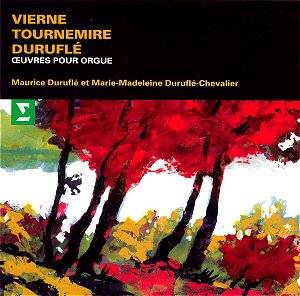Maurice Duruflé was a student of both
Vierne and Tournemire, and was hailed in his lifetime as not only
one of the greatest of French organists, but for his gifts as
a composer. Meticulous and highly self-critical, he left behind
only a small parcel of completed works. He is perhaps best known
for his Requiem mass, which although modeled after the equally
famous Requiem by his older countryman Gabriel Fauré, is
a strikingly original and magnificent work in its own right. Although
she had no real reputation as a composer, Duruflé’s wife,
Marie-Madeleine shared her husband’s fame as an organ virtuoso,
and to these ears, was the more fiery and adventuresome player
of the two. Lovers of organ music are fortunate then, to have
these recordings, perhaps some of the most authoritative available
of this repertoire, restored to the catalogue.
The two instruments heard here, both by the renowned
Aristide Cavaillé-Coll, are used to their fullest splendor
by these two masters of the instrument. I was particularly taken
by the striking colors of the celeste and reed stops, especially
when used with tremulant and played in chorus. The sound literally
jumps from the speakers and is a sheer delight to the ears.
There is nothing to criticize in the playing
by these two, and indeed it would be a bit pretentious on my part
to quibble at all with the execution of these works, known to
the artists most likely since their creation. The playing is flawless.
There are some real standouts, however, and they belong to Madame
Duruflé, and not to her more famous husband. Specifically,
I speak of the stunning renditions of Tournemire’s two improvisatory
works on chant themes. (Victimae paschali and Ave Maris
Stella.) Were it not for the phenomenal ears of Maurice, these
works would not have even come down to us. Tournemire never wrote
them down. But to our eternal benefit, they were recorded in performance,
and Mme Duruflé transcribed them via dictation from the
recordings. The performances of these works are nothing short
of astounding. Played with supreme authority and command, they
are overwhelming to listen to, nothing short of one thrill per
measure of music.
While Maurice was certainly one of the great
organists of his generation, he comes across in these recordings
as a good deal more conservative, both in his choice of registrations
and in the sheer force with which he plays than does his more
adventuresome spouse. I do not think this a criticism, rather
a very interesting contrast between the two organists, which reflects
their reportedly very different personalities.
Grateful as we must be for this reissue, there
is a great deal to criticize about Erato’s utterly sloppy packaging.
The program notes are so disjunctive and convoluted as to be nearly
worthless. There is no real commentary about the works themselves,
and all we really do get is a very confusing essay about the organists
and their relationships to the composer and to each other. There
is precious little information about either of these spectacular
instruments either. The lack of a stop list, and a more erudite
set of notes is inexcusable both for a company of Erato’s standing
and for a recording of this much historical significance.
Sound quality, although a little rife with background
hiss and noise from the organ blower at times, is fairly good
for a recording that is now forty years old. Despite the rather
poor production values, this is an essential for lovers of organ
music, but for the quality of the performances and for the sake
of historical documentation of two great artists. Recommended.
Kevin Sutton
